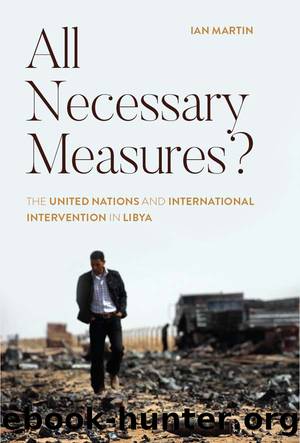All Necessary Measures?: the United Nations and International Intervention in Libya by Ian Martin

Author:Ian Martin
Language: eng
Format: epub
Publisher: Hurst
Published: 2022-03-30T00:00:00+00:00
6
REFLECTIONS AND REASSESSMENT
Today, there are many who suggest that it would have been better if there had been no military intervention in Libya. I find that ahistorical: in the context of the Arab Spring, and with the commitments made after Rwanda and Bosnia, it is not conceivable that the world would have stood by as it watched on its television screens Gaddafi brutally retaking control of Benghazi and the east. If it had, it is unlikely that Libya would have avoided prolonged civil war. As Wolfram Lacher writes:
The debate over whether intervention was justified would do well to take the imponderables facing decision-makers in March 2011 as its starting point, rather than the current chaos in Libya. It is a debate that all too often ignores the unknowns of the counterfactual scenario as well, particularly the trajectory the uprising would have taken without an intervention.1
But the lack of strategic foresight of those who intervened, especially the French and UK decision-makers, now seems astounding. The prospects of mediation leading to a managed transition faced an immense obstacle in the person of Gaddafi, but a more united international community might have achieved it. The external actors who drove the ground war, outside the framework of international law and with no accountability to the UN or domestically, bore a major share of the responsibility for the legacy of a proliferation of armed groups that it was beyond Libyaâs interim government to address. This was not an area of post-conflict support that could be left largely to the UN. A heavy international stabilisation mission was never a realistic possibilityânor, in my view, a desirable one. But those who led the intervention stood aside from their responsibility to address effectively the central aspect of the legacy of the conflict, and before long external actors would add to the problem rather than to any solution. The election that Libyans demanded, and succeeded admirably in organising, was a necessary condition for a government to have the legitimacy to address the security sector, but the actual government that emerged from that election would soon show that it was not a sufficient condition.
Reflecting on my own responsibility requires me to assess whether, within the context set by the intervening governments, the UN could have made a better contribution to the first stage of Libyaâs post-Gaddafi transitionâone that would have averted, or at least mitigated, later conflict and collapse.
When I became special adviser on post-conflict planning at UN headquarters in April 2011, my terms of reference were to consult with various parts of the UN system and prepare the overall vision, concept and guidance for design of a future UN mission in Libya. This was an unprecedented approach to mission planning, which usually began in earnest only when the political context became known and the UN could send a âtechnical assessment missionâ to the country concerned. Moreover, while I worked from the Department of Political Affairs as the lead department, I was given system-wide authority as special adviser to the secretary-general.
Download
This site does not store any files on its server. We only index and link to content provided by other sites. Please contact the content providers to delete copyright contents if any and email us, we'll remove relevant links or contents immediately.
The Secret History by Donna Tartt(19053)
The Social Justice Warrior Handbook by Lisa De Pasquale(12187)
Thirteen Reasons Why by Jay Asher(8893)
This Is How You Lose Her by Junot Diaz(6877)
Weapons of Math Destruction by Cathy O'Neil(6265)
Zero to One by Peter Thiel(5786)
Beartown by Fredrik Backman(5737)
The Myth of the Strong Leader by Archie Brown(5500)
The Fire Next Time by James Baldwin(5431)
How Democracies Die by Steven Levitsky & Daniel Ziblatt(5215)
Promise Me, Dad by Joe Biden(5141)
Stone's Rules by Roger Stone(5081)
A Higher Loyalty: Truth, Lies, and Leadership by James Comey(4954)
100 Deadly Skills by Clint Emerson(4921)
Rise and Kill First by Ronen Bergman(4779)
Secrecy World by Jake Bernstein(4741)
The David Icke Guide to the Global Conspiracy (and how to end it) by David Icke(4708)
The Farm by Tom Rob Smith(4502)
The Doomsday Machine by Daniel Ellsberg(4484)
